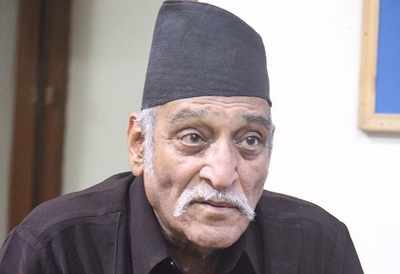- News
- entertainment
- events
- ranchi
- Cinema has become more democratic with the digital revolution: Mohan Agashe
Trending
This story is from August 3, 2019
Cinema has become more democratic with the digital revolution: Mohan Agashe

A psychiatrist, a theatre artiste and a Bollywood veteran, Mohan Agashe has juggled many roles in his lifetime. In his 70s, Agashe is vibrance and wit personified, as he shares his unique journey. On his first visit to Ranchi earlier this week, Agashe brought two of his Marathi films for screening at Ranchi’s first film festival on mental health awareness at the Central Institute of Psychiatry. RT had a chance to chat with the Sangeet Natak Akademi Award-winner, who stuck to his passion of acting through the decades. Read on…
RT had a chance to chat with the Sangeet Natak Akademi Award-winner, who stuck to his passion of acting through the decades. Read on…
Acceptance is a huge problem for aspiring actors, who are often pushed by their families to opt for a traditional and ‘safe’ career choice. Coming from a medical background, did your parents or the people around you support your acting career while growing up?
You see, acting actually helped me retain a ‘good boy’ image throughout medical school. Of course, like any other child I took part in school activities. As time passed, most students dropped out, but I continued. I would say I had some learning disabilities, but those weren’t recognised back then and like traditional Indian parents, my father wouldn’t hear of it. So, when acting started helping me with my academic performance, no one opposed what I was doing.
How was that?
Do you think today’s youngsters have a better chance than you at acting and filmmaking, since they don’t need academic excellence to have a chance at their passion?
I think that the medium of cinema has become more accessible with the recent digital revolution. Earlier, before the print revolution, exchange of knowledge was oral, and children developed sensory recognition, but post that, everything shifted to cognitive learning. Now, with the digital medium, they have a chance at breaking a tradition of centuries as the definition of literacy and education evolves. The career options for them are aplenty and the freedom to explore them is more accessible than ever.
You spoke of experiencing learning disabilities as a child. Mental health and its portrayal in Indian cinema have often been deemed inaccurate. What is your take on it?
Well, a story is never about mental health and the ailments portrayed is a part of the character’s journey. In India and in many parts of the world, cinema came as a disruptive medium for creative people, who believed in the mantra of entertainment. Because of the fun factor, factual compromises were made in most portrayals,
but with changing times and increased accountability, the scenario is slowly getting better.
What impact do you think films can make on the stigma around mental health?
I think telling people that a film is on mental health creates a stigma around it. It should be shown first and the viewers should be left to discuss the mental health part. My Marathi films, Kaasav and Astu, are based on a recovering mental health patient and dementia respectively. They are stories of the people, not the illnesses. I believe with the right approach, films can make a difference in how mental illnesses are perceived.
Tell us a bit about your ongoing projects, on and off the screen.
I have been part of a Marathi theatre production, Jara Samjhun Gya, based on the recent patient-doctor conflicts across the country. We have had around 60 shows so far. The story revolves around how the doctor-patient relationship has been disrupted by corporates and middlemen, and hence, the violence.

Acceptance is a huge problem for aspiring actors, who are often pushed by their families to opt for a traditional and ‘safe’ career choice. Coming from a medical background, did your parents or the people around you support your acting career while growing up?
You see, acting actually helped me retain a ‘good boy’ image throughout medical school. Of course, like any other child I took part in school activities. As time passed, most students dropped out, but I continued. I would say I had some learning disabilities, but those weren’t recognised back then and like traditional Indian parents, my father wouldn’t hear of it. So, when acting started helping me with my academic performance, no one opposed what I was doing.
How was that?
I couldn’t read well. I couldn’t grasp a word of what I read, mostly because of retention problems. So, I hung out in libraries, spotting the smart kids around me. I would approach them for a small coffee break when they looked tired after an hour or two and start a debate on a topic I didn't understand. They would always catch the bait and explain the topic to me and just like that, I learned everything I needed to. This continued throughout medical college and just because I hung out in the library, people around me thought I was a studious kid.
Do you think today’s youngsters have a better chance than you at acting and filmmaking, since they don’t need academic excellence to have a chance at their passion?
I think that the medium of cinema has become more accessible with the recent digital revolution. Earlier, before the print revolution, exchange of knowledge was oral, and children developed sensory recognition, but post that, everything shifted to cognitive learning. Now, with the digital medium, they have a chance at breaking a tradition of centuries as the definition of literacy and education evolves. The career options for them are aplenty and the freedom to explore them is more accessible than ever.
You spoke of experiencing learning disabilities as a child. Mental health and its portrayal in Indian cinema have often been deemed inaccurate. What is your take on it?
Well, a story is never about mental health and the ailments portrayed is a part of the character’s journey. In India and in many parts of the world, cinema came as a disruptive medium for creative people, who believed in the mantra of entertainment. Because of the fun factor, factual compromises were made in most portrayals,
but with changing times and increased accountability, the scenario is slowly getting better.
What impact do you think films can make on the stigma around mental health?
I think telling people that a film is on mental health creates a stigma around it. It should be shown first and the viewers should be left to discuss the mental health part. My Marathi films, Kaasav and Astu, are based on a recovering mental health patient and dementia respectively. They are stories of the people, not the illnesses. I believe with the right approach, films can make a difference in how mental illnesses are perceived.
Tell us a bit about your ongoing projects, on and off the screen.
I have been part of a Marathi theatre production, Jara Samjhun Gya, based on the recent patient-doctor conflicts across the country. We have had around 60 shows so far. The story revolves around how the doctor-patient relationship has been disrupted by corporates and middlemen, and hence, the violence.
End of Article
FOLLOW US ON SOCIAL MEDIA









